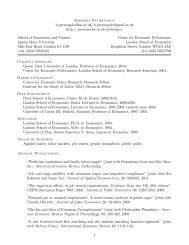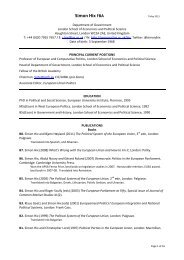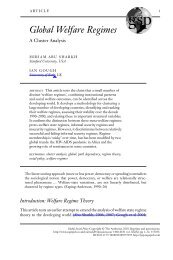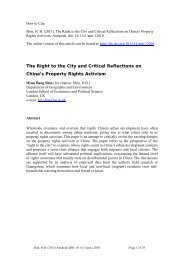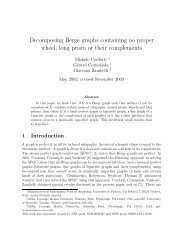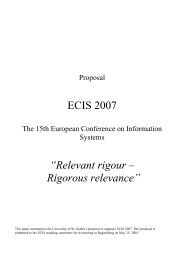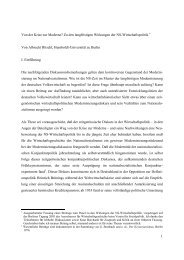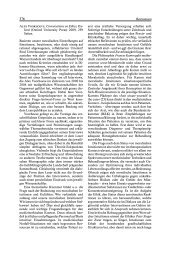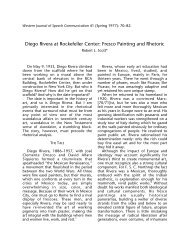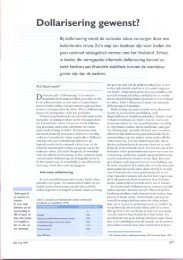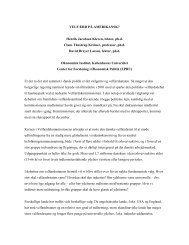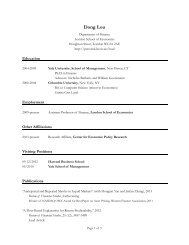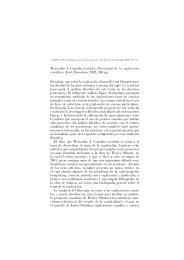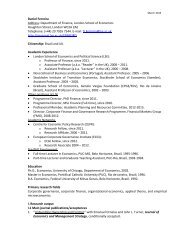The Rejected, the Ejected, and the Dejected: Explaining ...
The Rejected, the Ejected, and the Dejected: Explaining ...
The Rejected, the Ejected, and the Dejected: Explaining ...
You also want an ePaper? Increase the reach of your titles
YUMPU automatically turns print PDFs into web optimized ePapers that Google loves.
Benedetto, Hix / Government Rebels in House of Commons 761<br />
are not ideologically close to <strong>the</strong> government will be less likely to compromise<br />
<strong>the</strong>ir personal policy preferences <strong>and</strong> support <strong>the</strong> government than<br />
MPs who expected to be rewarded for <strong>the</strong>ir loyalty.<br />
Whe<strong>the</strong>r <strong>the</strong> party leadership can force ex-ministers, overlooked backbenchers,<br />
<strong>and</strong> ideological extremists to back <strong>the</strong> party also depends on <strong>the</strong><br />
electoral system <strong>and</strong> <strong>the</strong> way that c<strong>and</strong>idates are elected <strong>and</strong> deselected. For<br />
MPs who do not expect to st<strong>and</strong> in <strong>the</strong> next election, <strong>the</strong>se institutions are<br />
irrelevant. However, if MPs want to be reelected, regardless of <strong>the</strong>ir subsequent<br />
career prospects inside <strong>the</strong> next Parliament, <strong>the</strong>se rules matter.<br />
A party leadership is more able to enforce loyalty in party-centered electoral<br />
systems than in c<strong>and</strong>idate-centered systems (Carey & Shugart, 1995;<br />
Hix, 2004; Mitchell, 2000; Samuels, 1999). In <strong>the</strong> former—such as closedlist<br />
proportional representation—c<strong>and</strong>idates cannot increase <strong>the</strong>ir vote<br />
share by developing personal loyalty among <strong>the</strong> voters independent of <strong>the</strong>ir<br />
party. In <strong>the</strong> latter—such as open-list proportional representation or singletransferable-vote<br />
systems—<strong>the</strong>re are incentives for c<strong>and</strong>idates to gain support<br />
independently of <strong>the</strong>ir party leadership, <strong>and</strong> indeed <strong>the</strong>y might be<br />
rewarded by <strong>the</strong> voters for doing so.<br />
Single-member-simple-plurality (SMSP, or first-past-<strong>the</strong>-post) systems<br />
are between <strong>the</strong>se two extremes. Because only one politician is elected in<br />
each district, voters cannot choose between politicians from <strong>the</strong> same party.<br />
Also, campaigns in SMSP parliamentary systems tend to be fought on<br />
national party platforms ra<strong>the</strong>r than local c<strong>and</strong>idate personalities. Hence,<br />
<strong>the</strong>re are often few possibilities for politicians in <strong>the</strong>se systems to increase<br />
<strong>the</strong>ir electoral prospects independently of <strong>the</strong> performance of <strong>the</strong>ir party<br />
leadership, as Pattie et al. (1994) have shown in <strong>the</strong> case of Britain.<br />
However, because voters in SMSP systems are not forced to vote for a slate<br />
of c<strong>and</strong>idates, <strong>the</strong>re are opportunities for politicians to cultivate some personal<br />
support independently of voters’ support for <strong>the</strong> party <strong>the</strong>y represent.<br />
Also, if politicians have large majorities in <strong>the</strong>ir districts (“safe seats”), <strong>the</strong>y<br />
will be protected against <strong>the</strong> changing nationwide fortunes of <strong>the</strong>ir party.<br />
<strong>The</strong> rules for selecting <strong>and</strong> deselecting c<strong>and</strong>idates interact with <strong>the</strong><br />
design of <strong>the</strong> electoral system. Politicians are more autonomous from <strong>the</strong>ir<br />
leaderships if local party organs, ra<strong>the</strong>r than national party organs, select<br />
<strong>the</strong>m (e.g., Bille, 2001; Rahat & Hazan, 2001). Even when c<strong>and</strong>idates are<br />
chosen locally, to restrict local autonomy, parties often draw up a list of<br />
“approved c<strong>and</strong>idates” from which local parties can choose (as in <strong>the</strong><br />
British system). <strong>The</strong>n, once elected, politicians will be more concerned<br />
with deselection rules than rules governing <strong>the</strong> selection of new c<strong>and</strong>idates.<br />
Even if <strong>the</strong> national party leadership selects c<strong>and</strong>idates or screens<br />
Downloaded from<br />
http://cps.sagepub.com at SWETS WISE ONLINE CONTENT on July 6, 2007<br />
© 2007 SAGE Publications. All rights reserved. Not for commercial use or unauthorized<br />
distribution.



